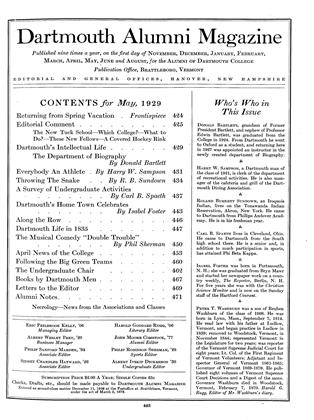This is an off season as far as sports are concerned, as the winter sport aggregations have finished out their schedules, and baseball is hardly under way. For some economical reason, the baseball team was not sent on their usual spring trip this year, and the men who hold the strings to the purses of the athletic department are doubtless thinking of the football team's sojourn to California in 1930 which will be quite an expense.
There has, however, been one extremely interesting development during the past week which is liable to affect the whole scope of intercollegiate baseball in the East, and should be warmly supported by all followers of the college game. Representatives from six major colleges of the East—Yale, Princeton, Cornell, Columbia, Pennsylvania and Dartmouth—recently met and agreed to form a six-team baseball loop, the schedule to be officially inaugurated in the Spring of 1930. It is immediately noticed that this league is made up of the same personnel as the Eastern Intercollegiate Basketball League, and the same powers are behind the movement.
College baseball, it must be admitted, has been on the wane for several years. Attendance and interest has been falling away from our national game as put on by amateur organizations, and not long ago there were several dispatches in the newspapers which declared that high schools in the Greater Boston area were not even putting baseball teams on the field this spring. Why this reaction to baseball should take place in this out-of-door era is open for discussion.
Football is, of course, the primary college game. It had. its birth within college circles, and even the professional players of the last three years have been able to make no inroads on the college football games in way of feverish interest and general spirit. Baseball, on the other hand, is acknowledged to be the national game of America, and from its very beginning it has been better known in a professional sense. What has built up the baseball interest among the public most is the competitive idea. The Big Leagues as they now stand would not draw the interest, obviously, if they were merely on an exhibition basis. The competitive idea is rooted in the general public's mind, and is growing in the college mind. People want daily standings of the team; they want to follow the rise and fall of their particular heroes from day to day in the releases of the batting averages. All of this is given to them in the professional game. College baseball games, therefore, have suffered. They can not hope to compete with football for a purely spectacular show as well as the game, and in this age even the glamor of "the deadly rival" is beginning to pass away except in the cases of a very few institutions, Yale and Harvard being the outstanding example. With the development of sports to such a high plane as they are in the colleges today, baseball has suffered the most.
In football, there are still the "big" and "little" teams. When big team meets big team, there is a great spectacle, thousands pour through the turnstyles, undergraduates band together in colorful cheering sections, and it might be safe to say that the game itself is becoming subordinated to all of this in the minds of a great many onlookers.
But what of baseball? All teams playing this game seem to be generally equal. Sewanee can smack Harvard and Oshkosh can administer a terrific beating to Yale, and then the following day, with new pitchers in the box, the tables will be turned. Long schedules carry the teams through 20 or 30 games, and of course there is not the glamor which is attached to the four or five crucial games of a football season.
Thus the formation of the Eastern Intercollegiate Baseball League is a very important and very noteworthy step on the part of the officials of the colleges participating. It will mean a two-game, home and home, series between each pair of teams, and in Dartmouth's case will mean that teams such as Princeton and Yale, who rarely appear in Hanover, will come up here to meet Dartmouth. But more than anything else, it will mean that Dartmouth, to bring the case home, will not be merely playing through a long baseball schedule with no particular importance attached to any one game, but that they will be competing with five other teams -—the best in the East—for a championship trophy. There will be renewed interest in the sport, and this interest will be founded upon the healthiest factor of all: the idea of competition over the course of a season.
 View Full Issue
View Full Issue
More From This Issue
-
 Article
ArticleA Survey of Undergraduate Activities
May 1929 By Carl B. Spaeth -
 Class Notes
Class NotesClass of 1898
May 1929 By H. Phillip Patey -
 Lettter from the Editor
Lettter from the EditorFor opinions which appear in these columns the Editors alone are responsible
May 1929 -
 Class Notes
Class NotesClass of 1923
May 1929 By Truman T. Metzel -
 Article
ArticleDartmouth Life in 1835
May 1929 -
 Class Notes
Class NotesClass of 1910
May 1929 By Arthur P. Allen
Phil Sherman
-
 Sports
SportsTHE INJURY JINX
December, 1928 By Phil Sherman -
 Sports
SportsSOCCER
December, 1928 By Phil Sherman -
 Sports
SportsCROSS COUNTRY
December, 1928 By Phil Sherman -
 Sports
SportsMCGILL BEATEN
JANUARY 1929 By Phil Sherman -
 Sports
SportsSwimming
JANUARY 1929 By Phil Sherman -
 Sports
SportsAnd the Hockey Demise
MARCH 1929 By Phil Sherman







